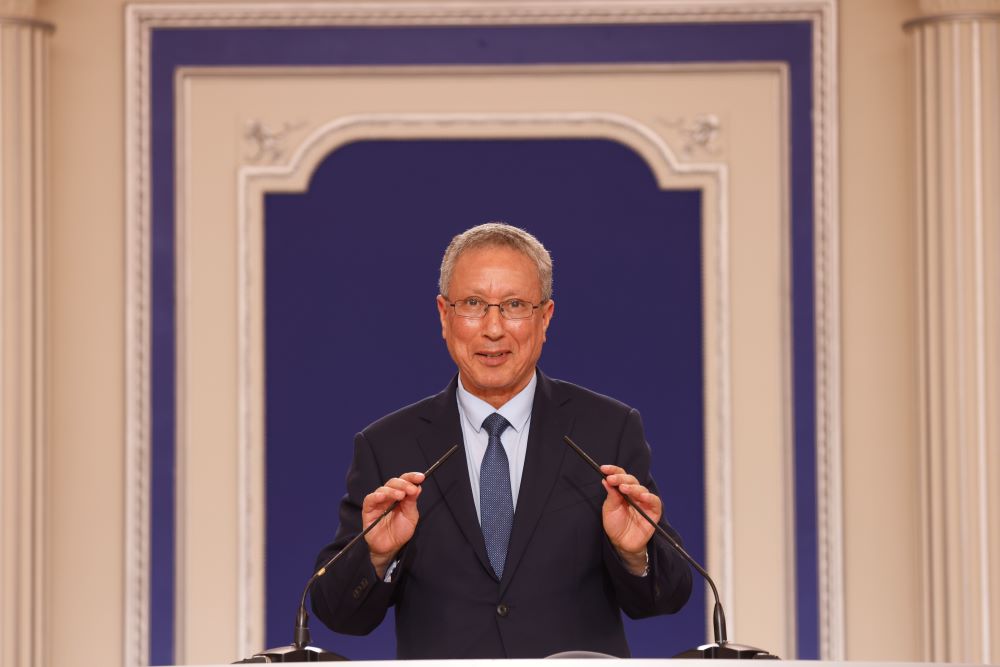
At theIranian Resistance conference, Tahar Boumedra, President of the Justice for Victims of the 1988 Massacre in Iran (JVMI), delivered a passionate speech about his firsthand experiences witnessing human rights abuses in Iraq, particularly those targeting residents of Ashraf.
Reflecting on his tenure with the United Nations Assistance Mission for Iraq (UNAMI), Boumedra recounted his unrestricted access to Camp Ashraf, where he witnessed severe abuses. He described the grim reality of his role, which often involved counting the bodies of victims—a duty that ultimately led to his resignation from the UN in protest. Boumedra also spoke about his resistance to efforts by the UN Legal Affairs Department to silence him, highlighting his unwavering commitment to exposing injustices.
Boumedra commended Professor Javaid Rehman, the UN Special Rapporteur on the situation of human rights in Iran, for his bravery and impartiality in documenting these violations. He emphasized the widespread appreciation for Rehman’s work and assured him of global support from peace and justice advocates.
In closing, Boumedra reiterated his dedication to uncovering human rights abuses and expressed his solidarity with the Iranian people and the Iranian Resistance.
The full text of Tahar Boumedra’s speech follows:
Thank you. Thank you very much, brothers and sisters in Ashraf 3. I salute you warmly. Let me say that I thank very much the speakers who took the floor before me, and I’m not going to repeat the legal issues that they addressed.
I’m just going to share with you probably what I would call a testimony, reporting to you exactly my experience in a very short way because I hope that Professor Javaid Rehman will benefit from what I went through myself.
As you know, the Unami mission in Iraq was established under Chapter 7. That means I was privileged to have access everywhere, and I had access to Ashraf 1, I would call it, without any limitations. At the time, civil society, lawyers, and doctors were prevented from entering the camp.
So, in this sense, I was a witness to all kinds of abuses and crimes that happened against my extended family living today inAshraf 3.
Once I lived in Ashraf and in Iraq in general was very painful, and my mission at the time was reduced to doing the body count of the victims. And that’s what prompted my resignation from the United Nations.
After resigning from the United Nations, I went to Washington and Ambassador Bloomfield was with me when I appeared before the congress. And I shared with them a small part of my experience in Iraq. And after that meeting at the congress, I received a letter from the legal department of the Legal Affairs Department of the United Nations in New York. And, literally, they were asking me to shut up. They told me to put up or shut up, and I did reply. I said to them, I will not put up and I will not shut up.
That letter is on my file at the United Nations and I also hold a copy of my reply to them. I said, see you in court. Of course, they didn’t dare to take me to court.
But, as I promised, I will not shut up. So I met every special reporter on a human rights situation in Iran from Ahmed Shaheed to Asma Jahangir and to our friend here, Javaid Rehman. And I tell you, I had never asked them to do anything. All I did say is that, I stand ready to share my experience with you, and I also always warned that as Special Rapporteurs, they will be eventually approached by people from all horizons, including the regime officers.
So, the Special Rapporteur, some of them are very vulnerable. Others show resistance. And I thank very much Professor Javaid Rehman who showed lots of courage. He has done an excellent job that goes into history, and his impartiality, his objectivity will make people think twice before they approach him because he is not somebody that one could easily twist his hand.
But I would like again to say to Professor Javaid Rehman that what he did is appreciated by all peace and justice lovers in the world. You will never be on your own. You’ll have friends all over the world.
Thank you very much.